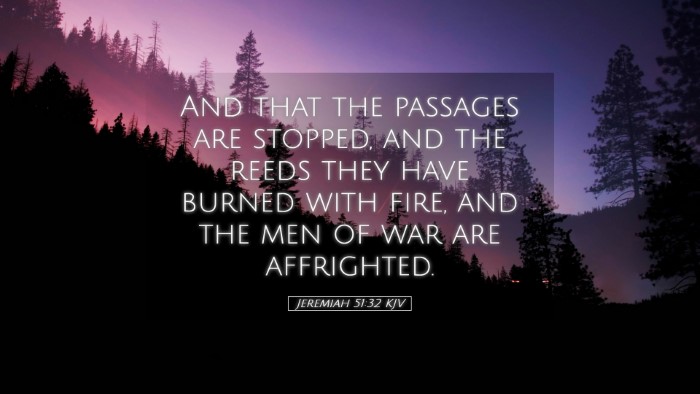Commentary on Jeremiah 51:32
Verse Text: "And that the passages are shut, and the reeds they have burned with fire, and the men of war are affrighted."
Introduction
This verse forms part of the prophecy regarding the fall of Babylon, highlighting God's ultimate judgment against this great empire. It illustrates not only the destruction of physical fortifications but also the psychological collapse of its military might. Various public domain commentaries illuminate the significance of this verse and its implications for understanding God's sovereignty and justice.
Contextual Analysis
The Prophet Jeremiah prophesied during a tumultuous period in Israel's history. The verses leading up to Jeremiah 51:32 describe the impending invasion of Babylon by the Medes and Persians. The imagery of closed passages and burning reeds signifies not merely physical destruction but the broader theme of divine judgment.
- Closed Passages: The shutting of passages implies an inability to escape or maneuver, symbolizing total defeat and the ensuing chaos that comes with it.
- Burnt Reeds: Reeds were often used in ancient constructions, including bridges and barriers. Their burning signals both destruction and vulnerability of what once seemed secure.
- Men of War Affrighted: The terror among the soldiers indicates a lost morale, reflecting divine intervention, causing fear in the hearts of an army that was once perceived as powerful.
Theological Implications
A deep theological exploration reveals much about the nature of God’s judgment and human pride. As noted in several commentaries, this passage can serve as a solemn warning about reliance on human strength and the presumptuousness of national pride.
- God’s Sovereignty: The text underlines God's control over nations and kingdoms. As Clarke notes, “God is a just judge and will not leave the guilty unpunished.”
- Judgment Against Idolatry: The fall of Babylon is also closely linked to its idolatrous practices, where reliance on false gods leads to downfall.
- Encouragement for the Faithful: For the people of Israel, the message serves to bolster hope and faith that God will defend His people and uphold His promises.
Insights from Commentators
Matthew Henry
Matthew Henry emphasizes the comprehensive nature of God’s judgment against Babylon, focusing on the certainty of divine retribution for sin and apostasy. He highlights that the mention of “the passages” closing is synonymous with the closing off of every means of escape and support for the Babylonians. Henry paints a vivid portrait of divine retribution at work where none can withstand the hand of God.
Albert Barnes
Barnes elaborates on the impending siege and the strategic importance of passages in warfare. He interprets the burning of reeds as a metaphor for the systematic dismantling of Babylon's defenses and a loss of its agricultural and economic strength. Barnes reflects on the historical accuracy of this prophecy, showcasing how the events unfolded in the Babylonian downfall in even greater precision than foretold, thereby affirming the prophetic voice of Jeremiah.
Adam Clarke
Clarke’s commentary delves into the symbolism inherent within the imagery of affrighted soldiers. His analysis suggests that fear among the warriors indicates a breakdown of morale, an effect of divine intervention in the hearts of the oppressors. Clarke highlights this as an illustration of God’s ability to inspire terror in the hearts of the proud and mighty.
Practical Applications
For pastors, students, and theologians, Jeremiah 51:32 serves as both a cautionary tale and a source of comfort. It provides practical applications that resonate in contemporary ministry:
- Faith in Divine Justice: Believers are reminded to trust in God’s righteousness and timing in dealing with injustice.
- Awareness of Human Frailty: This passage illustrates the precarious nature of human power; thus, humility should govern our pursuits, recognizing our dependency on God.
- Commitment to Authentic Worship: Reflecting on Babylon’s idolatry urges modern believers to ensure their lives and ministries are centered on authentic worship of the true God.
Conclusion
Jeremiah 51:32 is a profound reminder of God's sovereignty over nations and His commitment to justice. As the prophecies against Babylon unfold, modern readers are invited to reflect on their own paths, their reliance on God, and the futility of pride. Through careful study of commentaries, believers can glean rich theological insights that may strengthen their faith and inform their understanding of divine justice.


